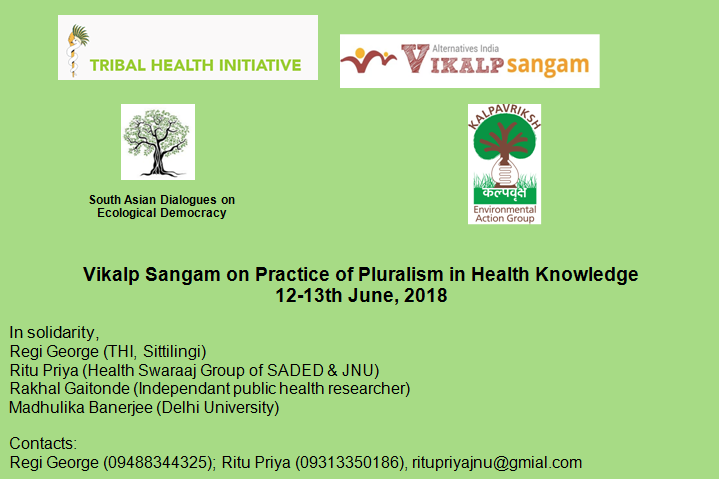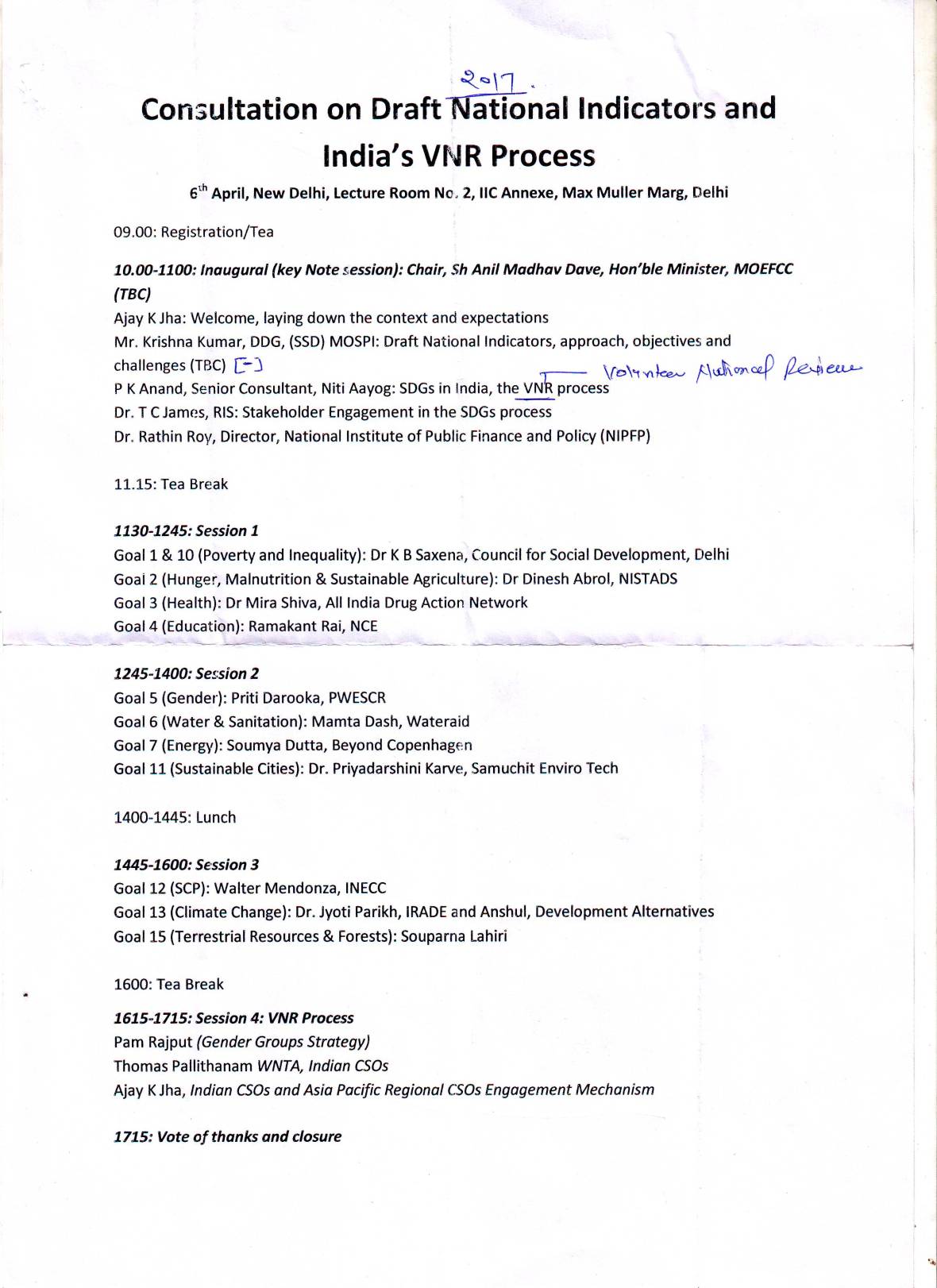CLICK HERE TO VISIT OUR WEBSITE
Live Event (Link Here) *
******

Time: 3:00 -7:00 pm
Venue: Jawahar Bhawan, Dr. Rajendra Prasad Road (Opo. Press Club of India) New Delhi-11001
*****
Wednesday, January 9, 2019 from 1:30 PM to 5:00 PM
The Rajiv Gandhi Institute for Contemporary Studies (RGICS), http://www.rgics.org is organising a dialogue on “Making Environmental Issues More Salient in India’s Politics – Lessons from the European Green Movement” on Wednesday, January 9, 2019 from 1:30 PM to 5:00 PM at the Rajiv Gandhi Foundation, Jawahar Bhawan.
The dialogue will start with a working lunch at 1:30 pm. We welcome participants getting to know each other over lunch. We will begin the dialogue at 2 pm. The topic will be introduced by Mr Jeet Singh, who leads the work of the RGICS on the theme of
Environment, Natural Resources and Sustainability.
At 2.10 pm, Mr. Vijay Pratap, the Convenor of SADED (South Asian Dialogues on Ecological Democracy) and Fellow, RGICS, will provide an overview on the topic, covering major milestones in making environmental issues more salient in India’s politics in the post- Independence period.
At 2.30pm, Mr. Marko Ulvila, a senior European Green Movement activist from Finland will describe the origins of the European Green Movement and how it gathered momentum in the last 30 years, what it has achieved and what it aims to achieve, as set out in the European Green Manifesto adopted in Nov 2018. (Attached herewith).
From 3 pm to 4.30 pm we will request participants to respond to the presentations and also share their own views on the topic of making environmental issues more salient in India’s politics. The last half hour will be used to look forward and plan any follow up actions.
The venue is the Ground Floor, at the Jawahar Bhawan, Dr. Rajendra Prasad Road, New
Delhi. For those coming the first time, please enter Jawahar Bhawan from the main gate
opposite Shastri Bhawan. Parking is available in the basement. Those preferring to use the Metro may please arrive at the Central Secretariat Metro Station and come out of Gate no 2, from where the venue is five minute walk.
We would be grateful if you could kindly indicate whether you will be able to participate by email to ecological.democracy@rgics.org or jeet.singh@rgics.org or by What’s App to
Jeet Singh at +91 98183 08489.
We look forward to seeing you.
Vijay Mahajan
Director
Rajiv Gandhi Institute for Contemporary Studies (RGICS)
*****

*************
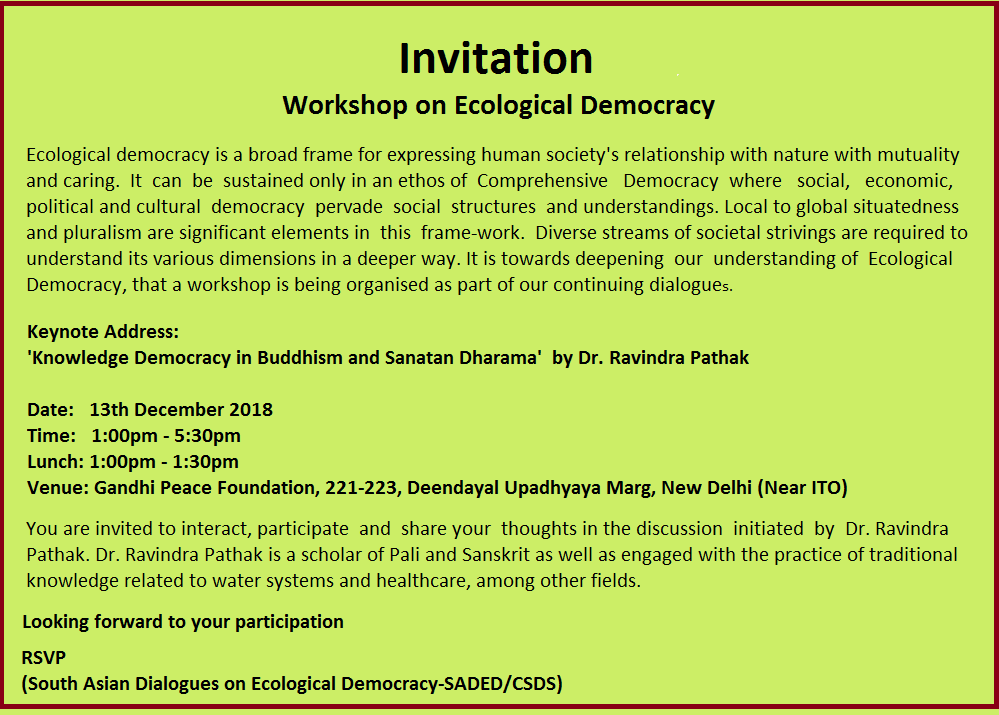

*********
Sustainable Development Goals 2030
Developing Perspective: Understanding National Heritage

Conversations- Baba Saheb Ambedkar
On 29 July 2018 at India Islamic Cultural Centre, Timing- 10:00 AM to 4.00 PM
Those committed to fundamental transformation are able to perceive principal contradictions of their time and provide a vision for the future. Baba Sahib Ambedkar belonged to a tradition which has been fighting one of the most challenging and obstinate institutionalized system of exclusion, discrimination, exploitation and inherent divisiveness among the marginalized majorities. Through the unique and near perfect operation of caste system Dalits are made invisible and still exploited and discriminated in an absolute sense. But it does not stop only at that, it operates in a manner that it continues to exclude large section of upper castes as well, making the PYRAMID more and more narrow at the top and broad at the base.
With the combined impact of vote raj, struggle for Samajik Azadi, political Azadi from British and India becoming a single modern state based on a written constitution has created a class of people among all the castes and communities who no longer perceive themselves as victims but as comprehensive change leaders on all the national and civilisational issues.
There is strong and pervasive urge among our youth to understand various strands of great debates during our national movement. All our great leaders were not in a polite conversation with each other. They were brutally frank, honest, non-populist and generally authentic while debating on real dilemmas of our traditions and its encounter with modernity and imperial power. We plan to have a series of conversations on our great national heritage. With this background in mind we are starting with Baba Saheb Ambedkar.
Dr. Ajit Jha, an activist –scholar of modern history will cover the following aspects. In four sessions he will make an initial presentation of half an hour, followed by a discussion in Hindi in each of the four sessions.
- Influences on Intellectual and ideological framework
- Contextualising General principles:
Colonial and Post Independent context and Dalit perspective
- Ambedkar: Political and Social Practice
- Ambedkar: Traditions/ Cultures / Religions
Date: 29 July 2018
Time: 10.00 AM. to 4.00 PM. with a lunch break
Venue:
India Islamic Cultural Centre, 87-88, Lodhi Road, (Near Lodhi Gardens), New Delhi -3
Vijay Pratap (pratapvijay2015@gmail.com)
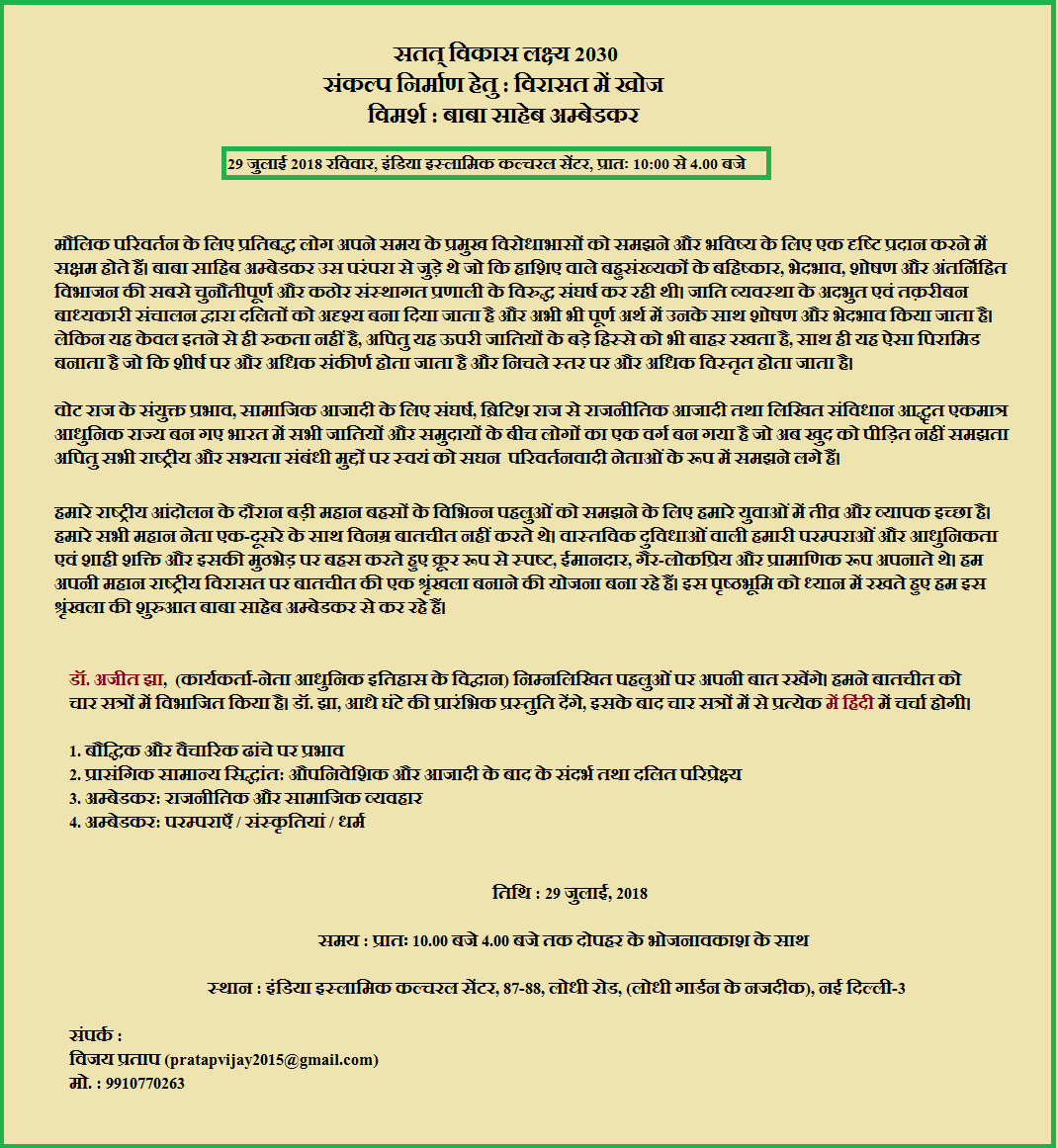
सतत् विकास लक्ष्य 2030
संकल्प निर्माण हेतु : विरासत में खोज
विमर्श : बाबा साहेब अम्बेडकर
29 जुलाई 2018 रविवार, इंडिया इस्लामिक कल्चरल सेंटर, प्रातः 10:00 से 4.00 बजे
मौलिक परिवर्तन के लिए प्रतिबद्ध लोग अपने समय के प्रमुख विरोधाभासों को समझने और भविष्य के लिए एक दृष्टि प्रदान करने में सक्षम होते हैं। बाबा साहिब अम्बेडकर उस परंपरा से जुड़े थे जो कि हाशिए वाले बहुसंख्यकों के बहिष्कार, भेदभाव, शोषण और अंतर्निहित विभाजन की सबसे चुनौतीपूर्ण और कठोर संस्थागत प्रणाली के विरुद्ध संघर्ष कर रही थी। जाति व्यवस्था के अदभुत एवं तक़रीबन बाध्यकारी संचालन द्वारा दलितों को अदृश्य बना दिया जाता है और अभी भी पूर्ण अर्थ में उनके साथ शोषण और भेदभाव किया जाता है। लेकिन यह केवल इतने से ही रुकता नहीं है, अपितु यह ऊपरी जातियों के बड़े हिस्से को भी बाहर रखता है, साथ ही यह ऐसा पिरामिड बनाता है जो कि शीर्ष पर और अधिक संकीर्ण होता जाता है और निचले स्तर पर और अधिक विस्तृत होता जाता है।
वोट राज के संयुक्त प्रभाव, सामाजिक आजादी के लिए संघर्ष, ब्रिटिश राज से राजनीतिक आजादी तथा लिखित संविधान आद्धृत एकमात्र आधुनिक राज्य बन गए भारत में सभी जातियों और समुदायों के बीच लोगों का एक वर्ग बन गया है जो अब खुद को पीड़ित नहीं समझता अपितु सभी राष्ट्रीय और सभ्यता संबंधी मुद्दों पर स्वयं को सघन परिवर्तनवादी नेताओं के रूप में समझने लगे हैं।
हमारे राष्ट्रीय आंदोलन के दौरान बड़ी महान बहसों के विभिन्न पहलुओं को समझने के लिए हमारे युवाओं में तीव्र और व्यापक इच्छा है। हमारे सभी महान नेता एक-दूसरे के साथ विनम्र बातचीत नहीं करते थे। वास्तविक दुविधाओं वाली हमारी परम्पराओं और आधुनिकता एवं शाही शक्ति और इसकी मुठभेड़ पर बहस करते हुए क्रूर रूप से स्पष्ट, ईमानदार, गैर-लोकप्रिय और प्रामाणिक रूप अपनाते थे। हम अपनी महान राष्ट्रीय विरासत पर बातचीत की एक श्रृंखला बनाने की योजना बना रहे हैं। इस पृष्ठभूमि को ध्यान में रखते हुए हम इस श्रृंखला की शुरुआत बाबा साहेब अम्बेडकर से कर रहे हैं।
डॉ. अजीत झा, (कार्यकर्ता-नेता आधुनिक इतिहास के विद्वान) निम्नलिखित पहलुओं पर अपनी बात रखेंगे। हमने बातचीत को चार सत्रों में विभाजित किया है। डॉ. झा, आधे घंटे की प्रारंभिक प्रस्तुति देंगे, इसके बाद चार सत्रों में से प्रत्येक में हिंदी में चर्चा होगी।
1. बौद्धिक और वैचारिक ढांचे पर प्रभाव
2. प्रासंगिक सामान्य सिद्धांत: औपनिवेशिक और आजादी के बाद के संदर्भ तथा दलित परिप्रेक्ष्य
3. अम्बेडकर: राजनीतिक और सामाजिक व्यवहार
4. अम्बेडकर: परम्पराएँ / संस्कृतियां / धर्म
तिथि : 29 जुलाई, 2018
समय : प्रातः 10.00 बजे 4.00 बजे तक दोपहर के भोजनावकाश के साथ
स्थान : इंडिया इस्लामिक कल्चरल सेंटर, 87-88, लोधी रोड, (लोधी गार्डन के नजदीक), नई दिल्ली-3
संपर्क :
विजय प्रताप (pratapvijay2015@gmail.com)
मो. : 9910770263
*************
“सतत् विकास के लक्ष्य: आजीविका का अधिकार एवं हमारा असंगठित क्षेत्र”
हरित स्वराज संवाद (सैडेड)
14 जुलाई 2018
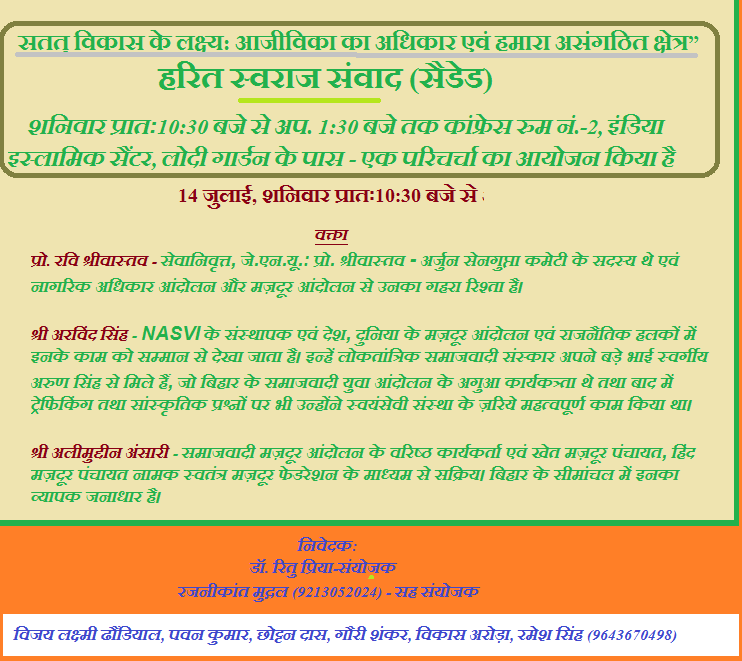
प्रिय साथी,
हमारे देश ने दुनिया के अन्य देशों की भांति 25 सितम्बर 2015 में विश्व बिरादरी के बीच ‘सतत् विकास के 17 लक्ष्यों‘ को 2030 तक पूरा करने का वायदा,बेहतर शब्द होगा संकल्प किया है। इस संकल्प को किये 3 बरस होने को आये हैं, लेकिन यह दुर्भाग्यपूर्ण विडम्बना है कि पूरी दुनिया की अर्थव्यवस्था उल्टी दिशा में जा रही है। वालमार्ट ने भारतीय बाज़ार पर कब्जा करने का चोर दरवाजा ढूंढ लिया है, जिससे हमारे छोटे व्यापारी, दुकानदार खुद और उनके स्टाफ का एक बड़ा हिस्सा वालमार्ट का सामान ढोने वाले असंगठित क्षेत्र का हिस्सा बन जायेंगे। वेंडरस् एवं पटरी-खोमचे वाले दुकानदारों पर अच्छी खासी मार पड़ेगी ही।
1977 के योजना आयोग में अर्थशास्त्री सदस्य प्रो. राजकृष्ण अक्सर कहा करते थे कि गरीबी के विरुद्ध सफल अभियान गरीबों के संगठित नेतृत्व के बल पर ही किया जा सकता है।
आजकल के बौद्धिक और राजनैतिक विमर्श में खास कर उसके शीर्ष पायदानों पर विराजमान बौद्धिकों और नेताओं में गरीबों के बारे में जानकारी, संवेदना एवं उनकी परिस्थिति को बदलने की चर्चा कम ही सुनने में मिलती है। यदि हमें सतत् विकास के लक्ष्यों की ओर बढ़ना है तो असंगठित क्षेत्र के बारे में व्यापक समाज में समझ का विस्तार, गहराई और संवेदना सभी आवश्यक हैं।
इसी सिलसिले में शनिवार प्रातः10:30 बजे से अप. 1:30 बजे तक कांफ्रेस रुम नं.-2, इंडिया इस्लामिक सैंटर, लोदी गार्डन के पास – एक परिचर्चा का आयोजन किया है:
“सतत् विकास के लक्ष्य: आजीविका का अधिकार एवं हमारा असंगठित क्षेत्र”
वक्ता:
प्रो. रवि श्रीवास्तव – सेवानिवृत्त, जे.एन.यू.: प्रो. श्रीवास्तव – अर्जुन सेनगुप्ता कमेटी के सदस्य थे एवं नागरिक अधिकार आंदोलन और मज़दूर आंदोलन से उनका गहरा रिश्ता है।
श्री अरविंद सिंह – NASVI के संस्थापक एवं देश, दुनिया के मज़दूर आंदोलन एवं राजनैतिक हलकों में इनके काम को सम्मान से देखा जाता है। इन्हें लोकतांत्रिक समाजवादी संस्कार अपने बड़े भाई स्वर्गीय अरुण सिंह से मिले हैं, जो बिहार के समाजवादी युवा आंदोलन के अगुआ कार्यकत्र्ता थे तथा बाद में ट्रेफिंकिंग तथा सांस्कृतिक प्रश्नों पर भी उन्होंने स्वयंसेवी संस्था के ज़रिये महत्वपूर्ण काम किया था।
श्री अलीमुद्दीन अंसारी – समाजवादी मज़दूर आंदोलन के वरिष्ठ कार्यकर्ता एवं खेत मज़दूर पंचायत, हिंद मज़दूर पंचायत नामक स्वतंत्र मज़दूर फेडरेशन के माध्यम से सक्रिय। बिहार के सीमांचल में इनका व्यापक जनाधार है।
अध्यक्षता (tbc):
श्री हरभजन सिंह सिद्धू – अ. भा. महामंत्री हिंद मज़दूर सभा, मजदूर आंदोलन का महत्वपूर्ण नाम हैं।
निवेदक:
डॉ. रितु प्रिया-संयोजक रजनीकांत मुद्गल (9213052024) – सह संयोजक
विकास अरोड़ा, विजय लक्ष्मी ढौंडियाल, पवन कुमार, छोट्टन दास, गौरी शंकर, रमेश सिंह (9643670498)
*********
Vikalp Sangam on Practice of Pluralism in Health Knowledge
12-13th June, 2018
This is an invitation for sharing of alternatives about health related knowledge and practice in the context of medical pluralism. Since the purpose is also to include in this sharing persons engaged in developing alternatives for a health system that is more democratic and people-centred but not actively working on medical pluralism, we thought that the efforts at ‘integration’ of more than one system of knowledge provides a point of dialogue between the two. The attached concept note clarifies the thinking with which this vikalp sangam is being organised.
This gathering is a part of the larger process of Vikalp Sangams (Alternatives Confluences) which are being hosted in various parts of the country. The basic idea of the Vikalp Sangam is to have regional, thematic and at a later stage national, gatherings to bring together initiatives focused on practical alternatives in different fields such as nature and natural resources, energy, education, health, crafts, media, justice, livelihood, market/trade, culture, governance, and so on.
Sharing of efforts at providing alternatives to the dominant knowledge of health and healthcare, especially of those that have attempted to integrate various health knowledges, is the focus of this Vikalp Sangam. From those practicing any one system other than the ‘conventional modern medicine’, those who are attempting to integrate more than one system of health knowledge and practice, to those who are promoting thinking about the legitimacy of pluralism in health knowledge and thereby characteristics of a health system that optimally incorporates this idea, all are welcome and invited to share their experiences and thoughts, their achievements and challenges. Given the hierarchies among health knowledges and practices prevailing in the present times, an openness and sensitivity to diverse world views and epistemologies will make the dialogue meaningful in taking forward our shared concern for creating systems for improving health of all.
The Vikalp Sangam is being organised with support of Kalpavriksh and Tribal Health Initiative (Sittilingi) who will provide for local stay over the two days. Participants are expected to bear their travel expenses. In case anyone has a constraint in doing so, as the organisers we will attempt to assist overcome this so that it does not prevent anyone interested in participating from doing so. The routes to reach Sitlingi are given below.
We recognise this is short notice, but look forward to your participation in the sharing that will help strengthening of all vikalps attempting improvements in health care. It will also help plan on how to take the process forward. Please confirm your participation at the earliest to facilitate organisation of the logistics and work out a realistic programme.
In solidarity,
Regi George (THI, Sittilingi)
Ritu Priya (Health Swaraaj Group of SADED & JNU)
Rakhal Gaitonde (Independant public health researcher)
Madhulika Banerjee (Delhi University)
Contacts:
Regi George (09488344325); Ritu Priya (09313350186), ritupriyajnu@gmial.com
_____________________
HOW TO REACH SITTILINGI
Airports : Chennai is the most convenient. Bangalore has less connections to Sittilingi , while from Chennai , there are day and night trains which come to nearby railway stations
Travel from Chennai:
Night Trains > The easiest to get tickets is the Salem express which starts from Egmore at 11pm. Get down at Vazhapady – the second stop after Attur [reaches at around 5am] The train stops for only a minute so please dont delay in deboarding – the platform is on the left as you face the direction of the train engine. Walk across to the bus stand. There is a Thiruvannamalai bus which leaves at 6am which parks across the road to the busstand [not in it]. Take a ticket to Sittilingi and ask to be dropped in front of the “Sittilingi hospital”. If the train is late and you miss the Thiruvannamalai bus, get into the V7 bus [inside the bus stand] and get down at Thumbal. At 8am you will connect to the Hosur bus and get down at the hospital. If in case you are coming in the Yercaud express, get down at Salem, take a bus to Vazhapadi and follow the rest of the instructions.
Going back > the Salem express leaves Vazhapadi at 9.40 pm and there are connection buses from here. You will reach Egmore at 4.30 am. The Yercaud leaves Salem at 10 pm – you will have to leave earlier from here.
If there are a number of people on the same train, we can send our vehicle to collect you.
From Chennai – day trains : The Kovai Express leaves at 6.15am from Chennai Central as also the West Coast Express at 11.15 am. Get down at Morappur. Take a bus to Harur and then onwards to Sittilingi. If there is no bus to Sittilingi at that time – please take a bus to Kotapatty and we can pick you up from there. Please call the office – 9585799061.
For those coming by train : The nearest big railway station is Salem and all trains stop there. Please let us know when you reach Salem and we will mail you instructions accordingly. Salem is 85km from Sittilingi and takes about 2 ½ hrs to reach.
PLEASE BOOK YOUR TICKETS NOW TO AVOID LAST MINUTE CONFUSIONS.
Please take a print out of this or save it on your phone for reference.
Lectures by Prof. Arun Kumar and Soumya Dutta (SADED and ICGS)
Date: 16 May 2018
Time: 10:45 a.m.
Venue: Gandhi Peace Foundation, 221-223, Deendayal Upadhyay Marg (Near ITO Metro Station, Gate No- 1), New Delhi- 110002
—
Dear Friends,
Your presence in the two lectures is being eagerly awaited by Indian Centre for Governance (ICGS), Chairperson Dr. Shambhu Shrivastava and South Asian Dialogues on Ecological Democracy (SADED) Convenor Prof. Ritu Priya.
*******
Lecture One
Contemporary Economic Policies: Marginalising the Marginals
वर्तमान आर्थिक नीतियाँ : हाशिये के समुदायो को ओर हाशिये की ओर धकेलना
Speaker: Prof. Arun Kumar
*******
Lunch: 12:45 to 1:30
********
Lecture Second Two 1:30 p.m.:
Towards A Sustainable, Equitable and just Energy Policy for India
भारत के लिए समतामूलक, न्यायमूलक एवं सतत उर्जा नीति की ओर
Speaker: Soumya Dutta
Website link: https://sadeddemocracy.wordpress.com/economic-democracy/
********
Invitation to a Dialogue Series
Towards Sustainable and Empowering Healthcare:
Gandhi’s Vision and its Relevance today

A healthcare crisis is being experienced globally. Gandhiji’s experiments with health related issues and his writings on health care have been widely published. Yet they do not seem to inform our understandings of health and health care today. Can they provide more sustainable and empowering ways of working for improving health?
We hope to generate dialogue on this in the coming 150th year of Mohandas Karamchand Gandhi’s birth, starting with Gandhi but not restricted to his work. In this first of the series, we have two economists present to us their study of Gandhi’s vision of health and health care.
Prof. Mark Lindley
‘Which Parts of Mahatma Gandhi’s Message about Health Care are Useful Today?’
and
Prof. Satish Jain
‘Gandhi’s Vision of Health and Health Care’
Chair: Shri Kumar Prashant
Discussant: Prof. Ritu Priya
Venue: Gandhi Peace Foundation, 221-223, Deendayal Upadhyaya Marg, New Delhi (Near ITO)
Date: 16th April, 2018
Time: 5 pm-8 pm
We hope you will be able to find the time to participate in this dialogue to recall and interrogate Gandhiji’s vision for health and its relevance in the present times.
We look forward to having you with us.
Sincerely,
Rajnikant Mudgal (South Asian Dialogues on Ecological Democracy-SADED)
Chris Mary Kurian (Health Swaraaj group of SADED)
Ashok Kumar (Gandhi Peace Foundation-GPF)
Programme
5pm: Tea
5.30-6.15 pm: Presentation by Prof. Mark Lindley
6.15-7.00 pm: Presentation by Prof. Satish Jain
7.00-7.10 pm: Discussant Prof. Ritu Priya
7.10-8.00 pm: Questions and Open discussion
8.00 pm: Chairperson’s remarks
Dr. Mark Lindley is an ecological economist, born in Washington DC in 1937 and studied at Harvard University (A.B.), Juilliard School of Music (M.A.) and Columbia University (D.Phil.). He has taught at several prestigious universities across the world including in India, and is author/co-author of more than 15 books –three about Gandhi and notable Gandhians.
Prof. Satish Jain is an economist recently superannuated from Jawaharlal Nehru University, New Delhi with expertise in Welfare Economics, and Law and Economics. He is an independent intellectual of the Gandhian-Socialist stream, and has an interest in Ayurveda.
************
Dear Friends,
PAIRVI and Beyond Copenhagen are organising a brain – storming session on
“THE CHALLENGES OF TRANSITION TO A SUSTAINBALE AND JUST ENERGY SOCIETY”
Chaired by Soumya Dutta
(Sh. Soumya Dutta, leading activist on Ecological / Climate crisis, associated with PAIRVI, Beyond Copenhegan and National Convener – BJVJ)
(1) Sh. Risto Isomaki, leading environmental activist from Finland, will speak on “The Potential of Solar Energy and the Challenges Producing Energy Sustainability”.
(2) Prof. P. Sudhakar will be speaking on “Challenges of Energy in Sustainability”
Date: 10th April 2018
Time: 3:00 pm to 6:00 pm
Programme:
Tea – 3:00 pm
Venue:
Annexe Lecture Room No. 1, India International Centre (IIC), 40, Max Mueller Marg, New Delhi – 110003
Prof. Ritu Priya
SADED (South Asian Dialogues on Ecological Democracy)
*************
Invitation: “Challenge of Deepening Democracy in Europe” – 10th April 2018, in IIC Annexe
Dear Friends,
Vasudhaiva Kutumbakam (SADED’s working group on democratizing comprehensively and globally) is organizing a discussion on “Challenge of Deepening Democracy in Europe”
Sh. Risto Isomaki will initiate the discussion. Mr. Risto Isomaki is a leading science fiction writer and environmentalists from Finland. Mr. Risto describes himself as politically homeless but close to the Finnish Centre Party, Green Party, Left League and Social Democratic Party in Finland.
Dr. Shambhu Srivastava, chairperson Indian Centre For Governance Studies will moderate the discussion.
Date: 10th April 2018
Time: 6:00 pm to 8:30 pm
Programme:
Tea – 6:00 pm
Presentation and discussion – 6:30 pm to 8:30 pm
Venue: Annexe Lecture Room No. 1, India International Centre (IIC), 40, Max Mueller Marg, New Delhi – 110003.
Hope you will be able to join this meeting
Vijay Pratap
Invitation for Public meeting on Gandlhi Sadbhawna Yatra after completion of yatra from Champaran to Rajghat
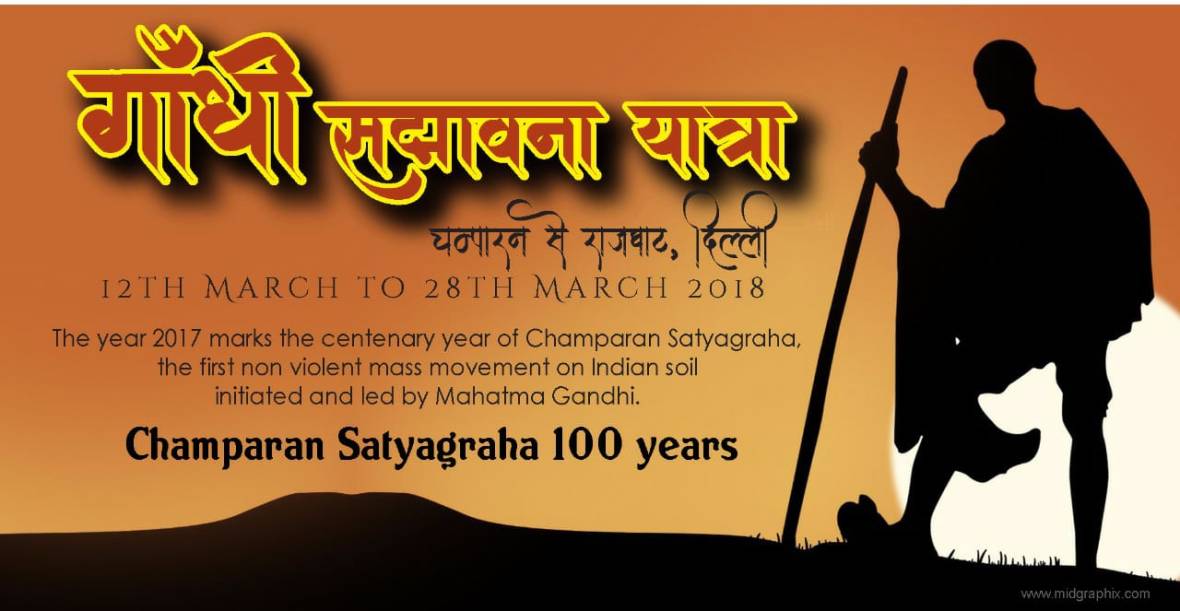
Dear Friends,
Greetings!
As you are aware, a team lead by Shri Anil K Singh of SANSAD started a Gandhi Sadbhawna Yatra from Bhitiharwa, Champaran on March 12th 2018 and, after covering around 1600 km and 20 districts of Bihar and Uttar Pradesh, will be concluding their yatra on March 28th 2018 by paying homage to Mahatma Gandhi at Rajghat. To welcome them and listen to their experience a public meeting is proposed to be organised at Gandhi Peace Foundation (GPF) as per the schedule below.
Venue: Gandhi Peace Foundation, Deendayal Upadhyay Marg, New Delhi
Date: March 29th 2018
Time: 4.00pm to 6.00pm
High Tea: 6:00pm
Several eminent persons including Sh. Swami Agnivesh, Prof Anand Kumar, Prof. Dilip Simeon, Sh. Shesh Narain Singh, Sh. N.R Mohanty and others will address the gathering.
We hope you will find time from your busy schedule and participate in this important meeting.
Thanking you,
Sincerely yours,
Amitabh Behar (NFI)
Surat Das (CBGA),
Kiran Saheen (Independent Consultant),
Narender Kumar (IPAC),
Gurinder Kaur (Former OXFAM),
Rajni Kant Mudgal (SADED),
Ajay Jha(PAIRVI)
Sunila Singh( Independent Consultant)
*******
25 March, 2018, 10:00 AM
The Politics of Health: Towards Sustainable and Empowering Health Care
A Workshop organised by
Sambhaavnaa Institute together with Health Swaraj Group of SADED
25th-31st March, 2018
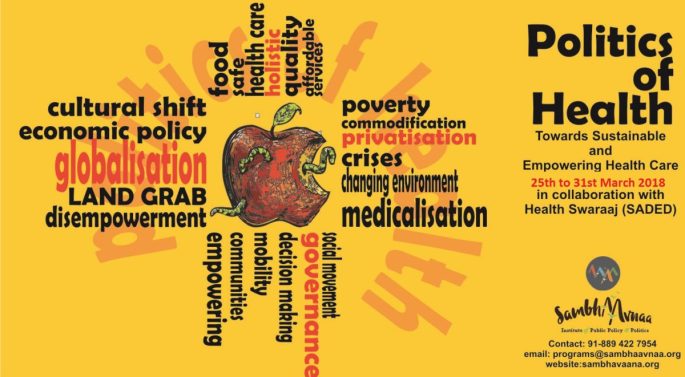
Background
The Indian enigma is that India’s health indicators are among the worst in the world despite our being one of the biggest democracies and fastest growing economies. Increasing life expectancy seems to mask the poor quality of life and its health consequences. Our children and adults are more malnourished than the populations in Sub-Saharan Africa. We have a triple burden of continuing communicable diseases such as tuberculosis, malaria and pneumonia, increasing non-communicable diseases such as heart disease, cancers and environmental pollution related problems, as well as increasing injuries due to traffic accidents, social violence and suicides. And access to affordable health care is becoming more difficult. Obviously, Indian development and health policies are not in sync with health conditions of the majority. Even though health and health care are concerns of each individual, we do not seem to give them due public policy attention, either in the overall planning processes for the country or in development of health services.
In the present times, people are facing three crises related to health. One is of changing disease patterns due to rapidly changing environmental, economic, social and cultural conditions for which preventive and therapeutic measures have still to be understood and applied. The second is of the difficulties faced in availing of affordable, safe and dependable health care. The third is the dominant perspective of health knowledge and services that have led to a medicalization and commodification of health, with loss of the capacity for ‘listening to one’s body’ and being involved in decisions related to one’s own health. Thereby, the domain of health and health care have become tools of dis-empowerment at individual, community and societal levels. Government policies have led to building up of a large health services infrastructure in the country, and also contributed to creation of the crises people are facing.
Several government, academic, civil society and social movement initiatives have attempted to address these concerns. These include the Primary Health Care approach adopted internationally as part of the WHO-UNICEF’s Alma-Ata declaration in 1978 and the building of public services since the 1940s in India. In recent decades, there has been the attempt to strengthening of public services through the National Rural Health Mission, the current international approaches of Universal Health Coverage and Sustainable Development Goals, campaigns such as for the Right to Food and Right to Health.
About the Workshop:
In this program, we will examine the public policy and non-government initiatives that have attempted to work towards bottom-up, pro-people and pro-poor health care systems. They will be explored for their approach and achievements against the backdrop of the dominant political economy of healthcare. To understand what the present situation of health care is and how it can be improved from a pro-people perspective we will examine the following questions:
- What all aspects affecting health are included in ‘health care’?
- What affects people’s access to appropriate and quality health care?
- What is ‘quality’ in health care?
- What is ‘medicalisation’ and ‘commodification’ of health?
- What decision-making about their health can lay people do, and what is ‘empowering’ or ‘disempowering’ for them in the context of health care?
- What are the implications of these processes for designing health systems?
In order to answer these questions, we will use available data on health and the experience of attempts to improve health care. While discussing issues informed by global experience, it will focus on the Indian context.
Methodology: Group Work, Interactive sessions, Presentations, Film screenings and lectures will be used to develop an understanding of the various dimensions of the politics of health. The options available for future development will be the purpose of the course. Sessions will be structured to:
- Explore reasons for inequalities in health status and health care as the ‘Politics of Access’
- Understand pluralism in health knowledge as the ‘Politics of Knowledge’, and the processes of decision-making for health as the ‘Politics of Governance’, with delineation of the linkages between the three.
- Move towards a collective re-conceptualization of what can be the future directions for a people-centered approach to health and healthcare.
- Examine these issues and develop an understanding of what can be done for designing health services that are sustainable and empowering.
Who is this workshop for: Health activists, journalists dealing with health issues, early and mid-career health care providers (doctors, nurses, paramedics) or anyone interested in people oriented health and health care; anyone interested in contributing to developing a better understanding of how to empower people to deal with health problems and creating social conditions that support the same.
Workshop Facilitators: The resource persons include:
- Madhulika Banerjee (Professor, Department of Political Science, Delhi University)
- Rakhal Gaitonde (Umea University, Sweden),
- V. Sujatha (Professor, Centre for the Study of Social Systems, JNU),
- Ritu Priya (Health Swaraaj workgroup of South Asian Dialogues on Ecological Democracy (SADED) and Professor at the Centre of Social Medicine and Community Health, JNU),
and others from the academic, civil society and movement spheres.
Language: The workshop will be conducted bilingually (English/Hindi)
Dates: 25th March 10:00 AM to 31st March 5:00 PM 2018.
Venue: Sambhaavnaa Institute, Palampur, Himachal Pradesh
Contact: For more information please call 889 422 7954 or email: programs@sambhaavnaa.org
Schedule for the program:
Day 1: Setting the Stage
- National and international health facts and figures, institutional structures and debates about health.
- Data of Health status and inequalities; What is health; Interpreting the data (eg numbers and rates; what indicators-disability-adjusted life year (DALY)
- SDHs; debates about determinants
- What is health care—individual, collective, societal systems; quality of health care, medicalisation and commodification; empowering and disempowering; ICDS and AWCs
- Vaccines— the technology and its role—smallpox and polio, malaria and HIV; commercial interests vs cost-effectiveness and safety
Day 2: Politics of Access
- Structure of health services and implications for access— public/private; traditional / modern; Doctor and hospital centred vs home-community-paramedic-GP-specialist layered continuum; NHPs for delivery of medicines/vaccines/medicalisation of child birth/
- Bhore to PHC to private sector to corporatisation to NRHM and UHC— unregulated medical profession as leader; nurses and caring missing; people’s knowledge and pluralism missing
- Financing— India and other countries; as against GDP but also absolute; Health insurance as option-good idea of risk pooling but becomes a profit making industry; necessity of public i.e. state/philanthropic support. Also non-commercial service and self care.
- Malpractice and over-prescription— medicalisation and commodification; corporatisation
- Rational drug use; Pharma, Patents and Pricing— 80% of OOP expenditure; TNMSC/Jan-aushdhalaya/ generic drugs
- Right to Health; Right to Food campaigns
- Access to medical commodities is not enough to ensure health for all, e.g. anaemia and maternal mortality
Day 3: Politics of Knowledge
Impact of colonialism and responses to it by various health related knowledge systems (Food and nutrition/Health and health care/); Medical pluralism in the present times; Issues of people’s dis-empowerment and empowerment through legitimization of knowledge. Impact of the pharma industry on the creation of knowledge and disease categories.
Day 4: Field visit
To interact with the local community and a range of health care providers.
Day 5
Politics of Governance: Health governance and management structures; Decentralisation v/s the idea of a National Authority; People’s role in monitoring and planning services—CBMP under NRHM; Role of diverse conceptual frameworks for design of health care systems.
Day 6
Re-writing PHC: Alma Ata document on Primary Health Care to be analysed and discussion on how it can be rewritten for people’s health and empowerment in the 21st century. Engaging with range of documents developed in the current context.
Day 7
Presentation and discussion of PHC 2.0 & Panel Discussion by all speakers and open discussion with participants.
******
जीवन का अर्थ और अर्थमय जीवन
हरित स्वराज संवाद की ओर से इस वर्ष भी डॉ. उषा पारिख की स्मृति को समर्पित बैठक आयोजित की जा रही है| इस बार डॉ. असीम श्रीवास्तव का व्याख्यान होगा|इसकी तफसील हम नीचे दे रहे हैं|
तिथि : 4 जनवरी 2018
स्थान : लेक्चर रूम नं-1, अनेक्सी, इंडिया इंटरनेशनल सेंटर (आई.आई.सी.),
नई दिल्ली
कार्यक्रम
सायं 5:30 : चाय
सायं 6:00 :
व्याख्यान : मेरी विचार यात्रा – संतुलन की तलाश और प्राकृतिक स्वराज
वक्ता : डॉ. असीम श्रीवास्तव
अध्यक्षता : प्रो. सतीश जैन
टिप्पणी के लिए विशेष आग्रह : सोपान जोशी, रितु प्रिया
खुली चर्चा
अध्यक्ष द्वारा समापन
भवदीय,
रजनीकान्त मुदगल, विजय लक्ष्मी ढौंडियाल, गौरी शंकर
विकास अरोड़ा, पवन कुमार, छोटन दास,रमेश सिंह
- Brief of Aseem Srivastava’s Lecture (4 Jan. 2018)
- मेरी विचार यात्रा – Aseem Shrivastava
- Prakritik Swaraaj
- From Democracy to Swaraaj_By Vijay_Pratap_& Ritu_Priya_
*******
पोप का सन्देश और धर्म का मर्म : एक चर्चा
अपने देश में कई धर्म के लोग एक साथ रहते ही हैं आज यातायात और संवाद के माध्यमों ने दूर देश के लोगों के बीच जानकारी और यात्रा की दूरी भी कम कर दी है | इसके बावजूद करीबी, आत्मीय और सदाशयतापूर्ण बातचीत कम होती जा रही है| धर्म जो एक गंभीर क्षेत्र है, जिसके अन्तर्गत अनेक विषय सम्मिलित हो जाते हैं, उन पर तो ऐसे संवाद की बहुत जरुरत है |
सैडेड से जुडे लोगों ने ऐसी चर्चा की आवश्यकता महसूस की और सोचा कि विभिन्न धर्मों-सम्प्रदाय के लोगों से संवाद किया जाए | इस प्रकार की बातचीत ‘धर्म जिज्ञासु मंच’ नाम से कई वर्षों से जारी है | उज्जैन के पिछले कुम्भ के दौरान और बाद में भी प्रयास जारी रहा |
साल 2015 में परम पावन पोप ने ईश्वर प्रशंसा में एक सन्देश दुनिया को दिया, जिसमें उन्होंने वैश्विक परिप्रेक्ष में मनुष्य, प्रकृति तथा समाज के अंतर्संबंधों तथा कई तात्विक बातों पर नए ढंग से प्रकाश डाला है |
हमने उस सन्देश से भी सारांश निकाले और अन्य धार्मिक-सामाजिक क्षेत्र के तात्विक मुद्दों को चिन्हित करने का प्रयास किया है, जिससे आगे बात जारी रखी जाए | हम उसे आपके समक्ष रखना चाहते हैं | साथ ही इस विमर्श में आपके योगदान की आशा भी रखते हैं |
इस उद्देश्य से एक बैठक नीचे दिए अनुसार रखी गयी है | दिनाँक 29.12.2017 को आयोजित की गयी है |
निम्न कार्यक्रमानुसार आप सादर आमंत्रित हैं |
तिथि : 29.12.2017
सायं 4:30 : चाय
सायं 5:00 : चर्चा
स्थान : गाँधी शांति प्रतिष्ठान (जी.पी.एफ.),
221-223, दीनदयाल उपाध्याय मार्ग, नई दिल्ली
निवेदक
रवीन्द्र कुमार पाठक
(09431476562)
धर्म जिज्ञासु मंच, सैडेड, नई दिल्ली
**********
आमंत्रण- 16-17 दिसम्बर 2017,गाँधी शांति प्रतिष्ठान
इस उन्नीस दिसम्बर को अनुपम मिश्र को हमसे बिछड़े एक पूरा बरस हो जाएगा| उनका अंतिम एकल व्याख्यान 4 जनवरी 2016 को ‘जीवन का अर्थ, अर्थमय जीवन‘ हुआ था| हालांकि यह व्याख्यान हरित स्वराज संवाद (सैडेड) के मंच से हुआ था लेकिन यह पूरे समाज को संबोधित करते हुए दिया गया था| अनुपम जी की भाषा और चिंतन किसी भी विचारधारा या संस्था के घेरे में बंधी नहीं होती थी| इसी वजह से यह व्याख्यान आज भी प्रतिष्ठित राजनैतिक, सामाजिक एवम् साहित्यिक पत्र-पत्रिकाओं में छप रहा है|
अनुपम जी की पैनी दृष्टि समाज और समय के अंतर्संबंधों को परत दर परत सामान्य जन के लिए उजागर करती जाती थी| इसी कारण विभिन्न पृष्ठभूमि के लोग उनकी अंतिम यात्रा में शामिल हुए, संचार माध्यमों ने उन पर अनेकों अनेक लेख छापे व टी.वी. चैनलों ने विशेष स्थान दिया| उनके जाने के तत्काल बाद दिल्ली में ही तीन बड़ी सार्वजनिक सभाएं हुईं| लेकिन फिर भी बहुतों के मन में टीस रह गई कि हमें कुछ कह्ना था|
इस टीस की सृजनात्मक भूमिका है कि यह हमारे समय और अनुपम जी के बारे में हमें सोचने-खोजने को मजबूर करती है| आइये, खुले दिलो–दिमाग से इस सोच को 16-17 दिसम्बर 2017 को गाँधी शांति प्रतिष्ठान में मिलकर साझा करें| मित्रों से अनौपचारिक चर्चा द्वारा बना कार्यक्रम निम्नलिखित है:
स्थान : गाँधी शांति प्रतिष्ठान (जी.पी.एफ.)
221-223, दीनदयाल उपाध्याय मार्ग, नई दिल्ली
तिथि : 16-17 दिसम्बर 2017
कार्यक्रम
16 दिसंबर, 2017
प्रातः 10:30 चाय
11 से 4.00 सत्र -1
हमारे जीवन में अनुपम का अर्थ और उन के काम की निरंतरता
अध्यक्षता : श्री राम चन्द्र राही
संचालन : श्री राकेश दीवान
वक्तागण : सहकर्मी एवं मित्र परिवार
1 से 2.00 भोजन
2 से 4.00 सत्र-1 जारी
अप. 4.00 चाय
4.30 to 6.00 सत्र-2 जीवन का अर्थ और अर्थमय जीवन
अध्यक्षता: श्री कुमार प्रशांत
वक्ता: श्री उदयन वाजपेयी
खुली चर्चा
सांय 6.00 चाय
______________
17 दिसंबर, 2017
प्रातः 11 से 1.00 सत्र –3 समाज के सहयोगी कार्यकर्ता की भूमिका
अध्यक्षता: सुश्री रजनी बक्शी
वक्ता: श्री मोहन हीराबाई हीरालाल
अप.1.00 भोजन
_______________________________________________
अनुपम मित्र परिवार
राकेश दीवान: 09424467604
विजय प्रताप: 09910770263
अशोक कुमार: 09818323936
**********
23 October 2017
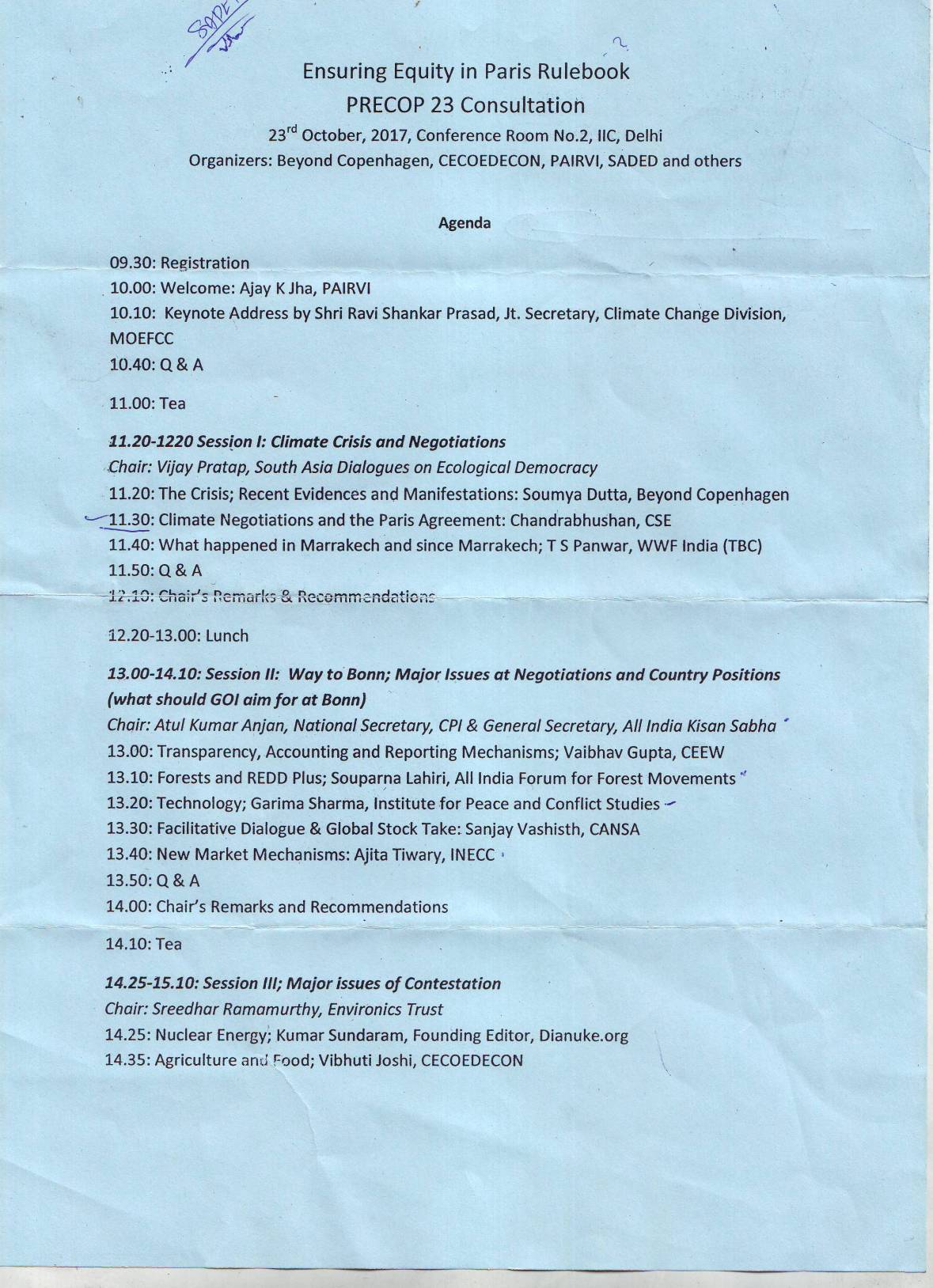
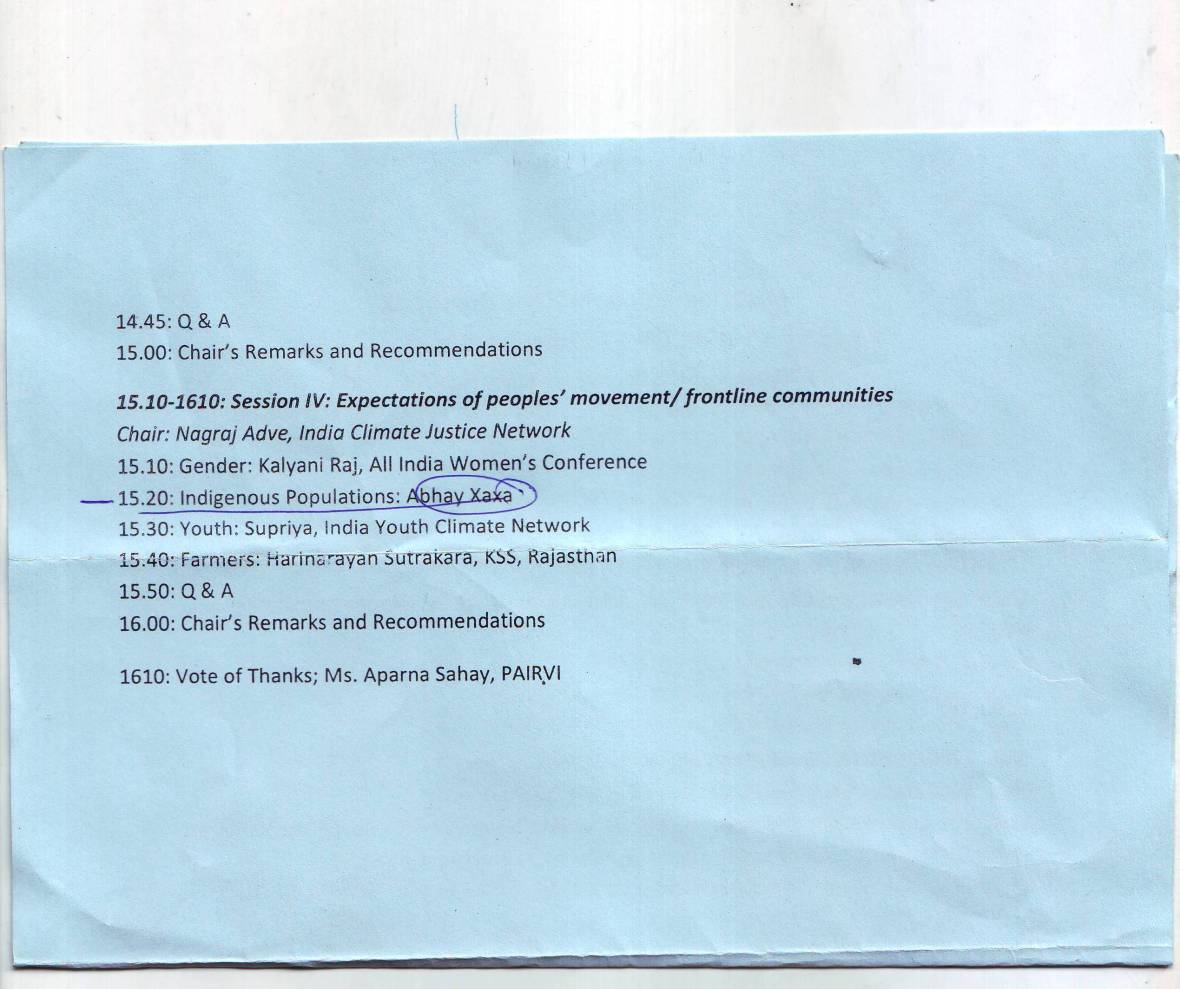
Minutes for Pre COP 23 – 23.10.2017
***********
आमंत्रण
दक्षिण एशियाई हरित स्वराज संवाद (SADED), ‘लोक नायक जयप्रकाश नारायण’ के जन्म दिवस पर आयोजित विमर्श में आपको सादर आमंत्रित करता है |
कार्यक्रम
दिनांक : 11 अक्टूबर 2017
समय : प्रात: 10:30 से सायं 4 बजे तक
स्थान : गाँधी शांति प्रतिष्ठान, 221-23, दीन दयाल उपाध्याय मार्ग,
नई दिल्ली – 110001
प्रात: 10:30 : चाय
प्रात: 11:00 – 1:00 – ‘परिवर्तन के युग दृष्टाओं से सीख’: गाँधी, मार्क्स, अम्बेडकर एवं जे. पी.
वक्ता : प्रो. मणिन्द्र ठाकुर, जे.एन.यू.
अध्यक्षता : डा. रघुवंश प्रसाद सिंह (संभावित)
अप : 1:00 – 2:00 – भोजन
अप: 2:00 – 4:00 – सतत् विकास लक्ष्य : वायदे और संभावनाएं
वक्ता : श्री अजय झा
अध्यक्षता : श्री सौम्या दत्ता
संयोजक : निवेदक :
रितु प्रिया विजय शर्मा : +91 9868009980 विजय लक्ष्मी ढौंडियाल : +91 9868174400 रमेश सिंह : +91 9971594368

***********
9 September 2017
‘Is Himalaya only a concern of People of the Himalayas or is it a Global Concern?’
Date: Saturday the September 9, 2017
Time: 2:30PM
Venue: CSDS, 29, Rajpur Road, Delhi -110054
Speaker : Prof. Jayanta Bandyopadhyay (Former Head of Centre for Development and Environment Policy, IIMC)
Dear Friends,
Greetings from SADED!
SADED has been observing Himalaya Diwas since 2010 on 9th September every year. The initiative was started under the guidance of many prominent social and environmental activists as wells scholars of the Himalayan region including Shri Sundarlal Bahuguna, Smt. Radha Behn Bhatt, Dr. Anil Joshi, and Prof. Jayanta Bandyopadhyay.
The initiative started by SADED and many other organizations and activists to observe 9th September as Himalaya Day got massive support from the people, and as a result the Uttarakhand Government officially proclaimed 9th September as Himalaya Diwas on 9.9.2014 to spread the message of conservation of the Himalayan ecosystems and declared that from 2015, the day would be celebrated by the State Government.
This year we are going to observe Himalaya Diwas in Delhi with a special lecture followed by discussion. This event is being co-organized by SADED, PAIRVI, and Bharat Jan Vigyan Jathha
We look forward to your joining us on this occasion.
Kindly confirm your participation by phone/ whatsApp or email.
Rajni Kant Mudgal Soumya Dutta Ajay Jha
(SADED) (BJVJ) (PAIRVI)
RSVP: Ramesh Singh
9971594368
***********
6 September 2017

**********
2nd September 2017

Dear Friends,
Harit Swaraj Samvad (SADED) in collaboration with the Pani Baba Foundation and G. Narendranath Fellowship is pleased to invite you to a meeting dedicated to the memory of Shri Arun Kumar Pani Baba and Shri G. Narendranath at N.D Tiwari Bhavan, Deen Dayal Upadhyay Marg, New Delhi on
2nd September 2017 from 12:00AM to 05:00 PM as per the following program.
Program
| 12:00 AM | Tea and Informal interaction
|
| 12:30PM | Presentation by Dr. Uma Shankari on
‘Where have all the waters gone?’ followed by discussion |
| 14:00PM | Lunch
|
| 14:30PM | Presentation by Shri Nagesh Kolagani on ‘Participatory GIS based water accounting and management: Case study of an upland village in Chittoor district of AP state’ followed by discussion |
| 16:00PM | Homage to Arun Kumar Pani Baba and Shri. G. Narendranath
|
| 16:30PM | Bestowing G. Narendranath Fellowship to Lawyer and Social Activist Ms. Meera Sanghamitra
|
| 17:00PM | Vote of Thanks by Shri. Venkat Ram Batuk |
—-
Purnima Arun Kumar (Pani Baba Foundation)
Rajni Kant Mudgal, Vijay Sharma, Vijay Laxmi Dhoundiyal (SADED)
******
2nd September 2017

*****
August 23, 2017
‘Importance of Nepal-India People to People Relations’
August 23, 2017, time: 10.00 a.m.
Venue: Conf. Room No.2, Main Bldg.,India International Centre (IIC), Lodhi Road. Organised by Solidarity Centre for South Asian Democracies
2017 is an unusually significant year in global affairs, but it is more so in Nepal-India ties. Lately, two neighbours have made efforts to make high level state visits more regular. However, there are many issues that have been creating misunderstandings at the citizens’ level of two countries. Major foundations of Nepal-India ties i.e. open border between two countries, 1950 treaty which provides equal national treatment to citizens of both the countries, etc. have been questioned by the people in both the countries due to the various reasons more because of ideological motivations than due to a nuanced understanding of the ground realities. Sometimes natural calamities including flood become issues of uninformed debate in popular media. Also, new initiatives i.e. China proposed one Belt one Road Initiative (BRI), India initiated Bay of Bengal Initiative for Multi-Sectoral Technical and Economic Cooperation (BIMSTEC), etc. have made people further confused about the traditional relationship between Nepal and India.
Given the background we wish to organise a round-table on “Importance of People-to-People Relations” at IIC, Delhi on the 23rd of August 2017. Official visit of the PM of Nepal Honourable Sher Bahadur Deuba also begins on 23 August 2017. The objective of the event is to have better understanding about the contemporary situation of Nepal-India relations and future direction, the discussants will be politicians, civil society members, academia and media persons from both the countries.
Dr. Uddhab Pyakurel(SADED – Nepal)
Anil Mishra(J.P. Foundation)
Vijay Pratap(Socialist Front)
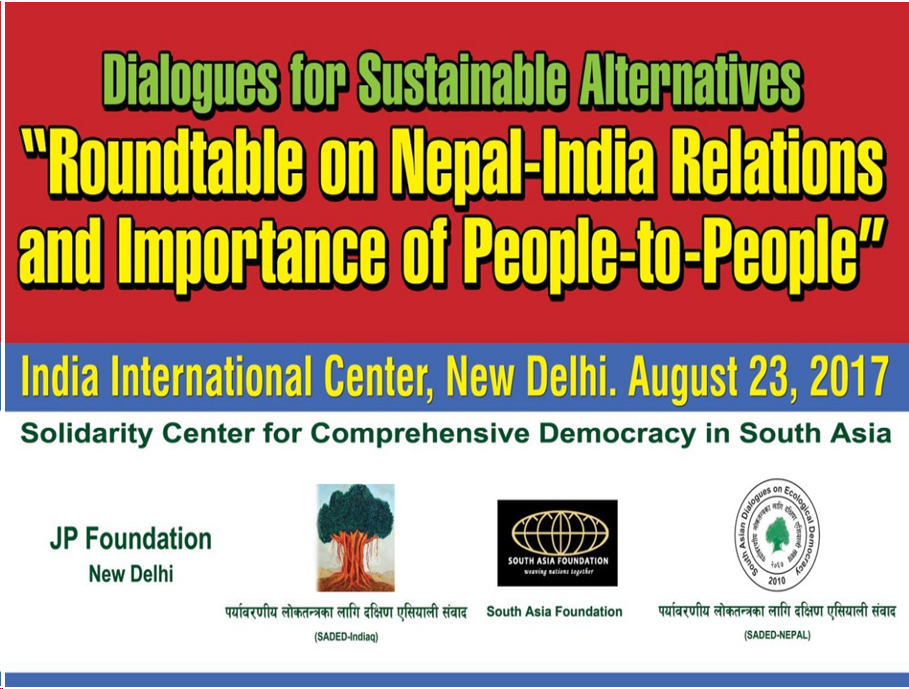 = = = = =
= = = = =“नेपाल-भारत नागरिक सबंधों का महत्व”
23 अगस्त 2017; प्रातः 10 बजे
स्थान – कांफ्रेंस रूम नंबर-2 , इंडिया इंटरनेशनल सेंटर, लोधी रोड, नई दिल्ली
आयोजक- सॉलिडेरिटी सेंटर फॉर साउथ एशियन डेमोक्रेसीज
****
06th August 2017
A SPECIAL GUEST LECTURE
By
Eminent Theater activist Sh. Prasanna
On
‘“Challenges of Revival of Khadi in present time”
Date: 06th August 2017 Time: 10:00 A.M
Vijay Pratap Ajay Jha Soumya Dutta
SADED PAIRVI BJVJ
*****
22-04-2017

************
6 April 2017
***********
24-28 April 2017

|
The Politics of Health: Towards Sustainable and Empowering Health Care A Workshop organised by Sambhavanaa Institute and Health Swaraaj Group of SADED |
|
Background: The Indian Enigma is that India’s health indicators are among the worst in the world despite our being one of the biggest democracies and fastest growing economies. Increasing life expectancy seem to mask the poor quality of life and its health consequences. Our children and adults are more malnourished than the populations in Sub-Saharan Africa. We have a triple burden of continuing communicable diseases such as tuberculosis, malaria and pneumonia, increasing non-communicable diseases such as heart disease, cancers and environmental pollution related problems, as well as increasing injuries due to traffic accidents, social violence and suicides. And access to affordable health care is becoming more difficult. Obviously, Indian development and health policies are not in sync with health conditions of the majority. Even though health and health care are concerns of each individual, we do not seem to give them due public policy attention, either in the overall planning processes for the country or in development of health services. In the present times, people are facing three crises related to health. One is of changing disease patterns due to rapidly changing environmental, economic, social and cultural conditions for which preventive and therapeutic measures have still to be understood and applied. The second is of the difficulties faced in availing of affordable, safe and dependable health care. The third is the dominant perspective of health knowledge and services that have led to a medicalization and commodification of health, with loss of the capacity for ‘listening to one’s body’ and being involved in decisions related to one’s own health. Thereby, the domain of health and health care have become tools of dis-empowerment at individual, community and societal levels. Government policies have led to building up of a large health services infrastructure in the country, and also contributed to creation of the crises people are facing. Several government, academic, civil society and social movement initiatives have attempted to address these concerns. These include the Primary Health Care approach adopted internationally as part of the WHO-UNICEF’s Alma-Ata declaration in 1978 and the building of public services since the 1940s in India. In recent decades, there has been the attempt to strengthening of public services through the National Rural Health Mission, the current international approaches of Universal Health Coverage and Sustainable Development Goals, campaigns such as for the Right to Food and Right to Health. About the Workshop: In this program, we will examine the public policy and non-government initiatives that have attempted to work towards bottom-up, pro-people and pro-poor health care systems. They will be explored for their approach and achievements against the backdrop of the dominant political economy of healthcare. To understand what the present situation of health care is and how it can be improved from a pro-people perspective we will examine the following questions: What all aspects affecting health are included in ‘health care’? Methodology: Group Work, Interactive sessions, Presentations, Film screenings and lectures will be used to develop an understanding of the various dimensions of the politics of health and the options available for future development, will be the purpose of the course. Sessions will be structured to: ▪ Explore reasons for inequalities in health status and health care as the ‘politics of access’ Who is this workshop for: Health activists, journalists dealing with health issues, early and mid-career health care providers (doctors, nurses, paramedics) or anyone interested in people oriented health policy issues, to contribute to developing a better understanding of how to empower people to deal with health problems and creating social conditions that support the same. To Know more and apply please click here: https://goo.gl/UAKB3W |
|
Other Details: Dates and Venue: 24th April 10:00 AM to 28th April 5:00 PM., Sambhaavnaa Institute, Palampur, Himachal Pradesh. Contribution towards Programs Costs: We hope that participants would contribute an amount of Rs. 3500 for 5 days/- towards workshop expenses, inclusive of all onsite workshop costs: boarding, lodging, and all the materials used in the workshop. However, for those who cannot afford this amount please feel free to choose the partial contribution option in the application form. Resource Persons: Workshop Facilitators: The resource persons include: Madhulika Banerjee (Professor, Department of Political Science, Delhi University) Rakhal Gaitonde (Senior Scientist, Centre for Technology and Policy, Indian Institute of Technology, Madras), Sujatha (Professor, Centre for the Study of Social Systems, JNU), Ritu Priya (Health Swaraaj workgroup of South Asian Dialogues on Ecological Democracy (SADED) and Professor at the Centre of Social Medicine and Community Health, JNU), and others from the academic, civil society and movement spheres. Language: Hindi/English Contact: For more information please call 889 422 7954 or email:programs@sambhaavnaa.org |
|
Hope to see you there, Programs Manager, |
*******************
January 20th-22th 2017
Workshop on the relevance of Commons for Sustainable development
As you are aware, the workshop on the relevance of Commons for Sustainable development is taking place at Udaipur from 20th -22nd January 2017.
Venue: Vidya Bhawan Krishi Vigyan Kendra Badgaon, main office
Stay: Vidya Bhawan Krishi Vigyan Kendra, hostel
Time: 20th – 22nd January
January 2017
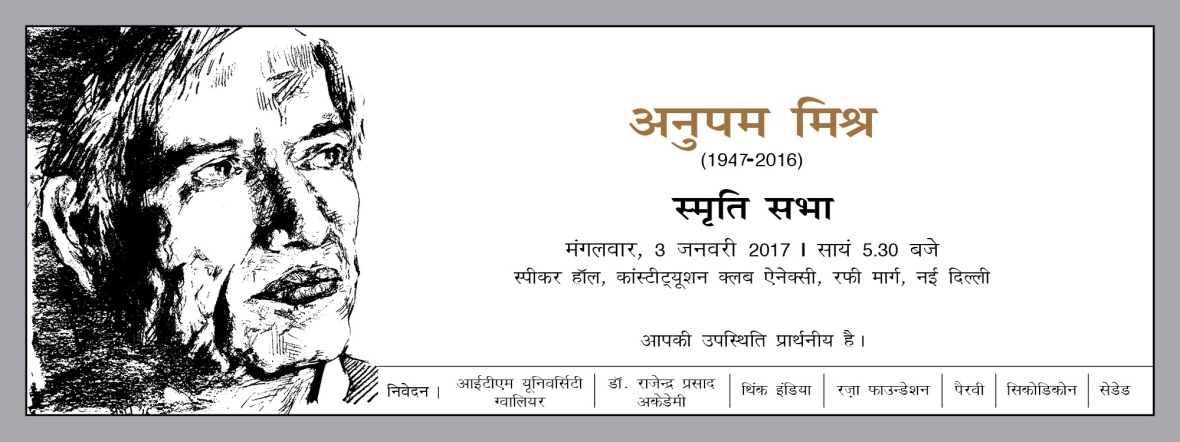
January 10, 2017
SADED OFFICE; HIMALAYAN MANIFESTO
January 14, 2017
SADED OFFICE; HIMALAYAN MANIFESTO
January 4, 2017
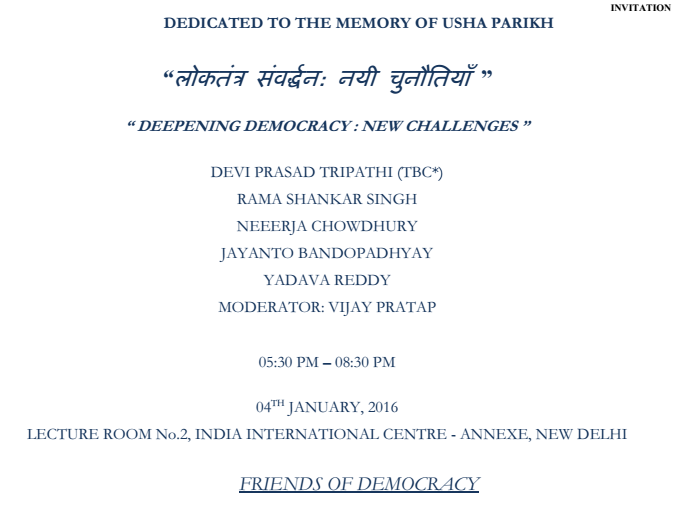
07th APRIL, 2016
December 2016 : https://greenfeaturescom.wordpress.com/2017/01/25/meeting-reports/
In 2016:
You are cordially invited to attend and participate in the discussion
ON
“The Agricultural Crisis in India with special reference to Karnataka”
A KEYNOTE LECTURE
by Professor Sh. T.N. PRAKASH
(Chairperson, Karnataka Agriculture Price Commission)
LECTURE AND DISCUSSION CHAIRED BY Professor. T. HAQUE
DATE: 07TH APRIL, 2016
TIME: 05:30 PM : Registration and High Tea
06:00 PM onwards : Keynote Lecture followed by Open House Discussion
VENUE: Seminar Room No-2, KamlaDevi Complex, India International Centre, Lodhi Load, New Delhi-110003
14th of April, 2016 to 16th of April 2016
‘FOR A BETTER WORLD’
ROUNDTABLE SERIES
You are cordially invited to attend and participate in the SADED ‘Roundtable Series – For a Better World’
A Symposium of meetings and discussions by eminent academicians, activists, and civil society practioners
Being held from the 14th of April, 2016 to 16th of April 2016
AT THE GANDHI PEACE FOUNDATION
(Deen Dayal Upadhyay Marg, Delhi)
14th APRIL, 2016 : Perspectives from the Politics of Caste Annihilation {1PM to 5PM}
15th APRIL, 2016 : Rural Livelihoods – Issues of Dignity and Macro Policy {10AM to 5PM}
16th APRIL, 2016 : Contours of Ecological Democracy {5PM to 8PM}
*********

